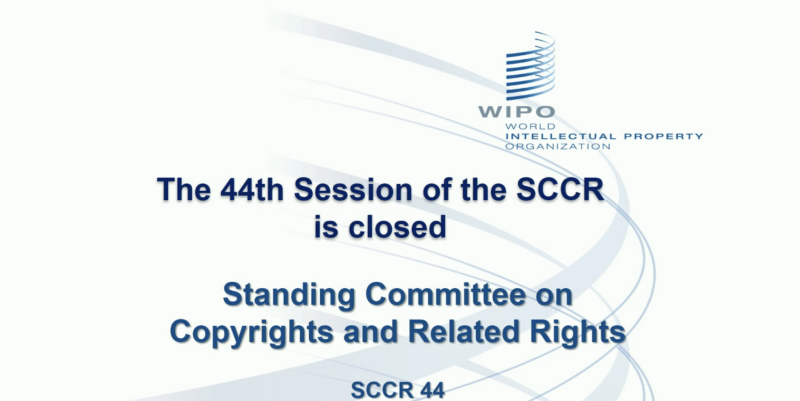The final day of this shortened SCCR saw blue skies over Geneva. The discussions in the plenary shifted to ‘Other Matters’ but with breaking news of a Group B proposal for an information session on artificial intelligence at the next SCCR.
Firstly, the WIPO secretariat summarised the information session on music streaming markets from SCCR 43 before comments from Member States on the GRULAC proposal around Copyright in the Digital Environment. This was the opportunity for Côte D’Ivoire to present its Proposal for a Study on the Rights of Audiovisual Authors and their Remuneration for the Exploitation of their Works.
The Chair then invited Group B to present its Proposal for an Information Session on Generative AI and Copyright.
All these topics seemed to caught within an overarching Copyright in the Digital Environment, but there remained a split between delegations in the room with some requesting more time to consider either the Group B or the Côte D’Ivoire proposals. The Chair encouraged further discussions during the coffee break to try to advance preparations for the next SCCR.
After a brief break, delegations from Uruguay and France were given the opportunity to present recent legislative changes in their respective countries. Uruguay has recently updated its copyright law to secure remuneration for creators for the digital exploitation of their works and France presented the conclusion of inter-professional discussions, supported by the Ministry of Culture, to secure minimum levels of remuneration for streaming.
The afternoon started with a series of secretariat summaries on the remaining ‘Other Matters’:
On the Artist Resale Right: part 1 (covering regulatory aspects) of the planned toolkit had been presented at SCCR 43 by Professor Sam Ricketson and was well received. WIPO has entrusted Professor Ricketson to work on the second part of toolkit which will cover more practical aspects. The EU and India supported the resale right being given more time at SCCR should the agenda evolve.
Rights of theatre directors: following presentation of the study at SCCR 41, exchanges with professionals are ongoing. The WIPO secretariat is gathering feedback from the live arts sector and an updated report will be presented at the next SCCR.
Public Lending Right: further to the SCCR 43, the WIPO secretariat has begun the preparation of a scoping study. An expert will prepare an initial draft ahead of a peer review process. Brazil checked whether its 3 issues raised at SCCR 43 – eBooks, exhaustion of rights and compulsory licensing – had been included in the terms of reference. The Chair confirmed that the study will look at PLR regimes around the world, and so, to the extent that Brazil’s issues are covered by existing examples, that they will be included.
The Regional Group Coordinators then left the plenary to finalise the Chair’s summary with the intention of avoiding the late finish of SCCR 43.
6:00pm came and went. The plenary screen showed the meeting resuming at 6:45pm, then 7:30pm, then 8pm, then 8:30pm. Delegations returned to the room shortly after 8:30 and then the Chair, Owen Ripley, proceeded to present his summary of the week’s proceedings and outcomes.
Of note:
Broadcasting: The outgoing Chair will ‘close out’ the work on the draft by addressing technical issues. He also summarised progress as follows:
‘any potential treaty should be narrowly focused on signal piracy, should not extend to any post-fixation activities and … should provide member states with flexibility to implement obligations through adequate and effective legal means.’
‘… there are three main remaining decision points of this agenda item, specifically:
- Whether there should be a minimum level of protection for transmissions over computer networks; and if so, what kind and level of protection.
- The scope of programme-carrying signals to be protected by any treaty, specifically pre-transmission access, catch-up (transmission of “stored programmes”) and pre-broadcast signals.
- Striking the right balance concerning the approach to limitations and exceptions.’
Exceptions and Limitations
Comments on Professor Xalabarder’s scoping study can be submitted to the WIPO secretariat (copyright.mail@wipo.int) until 12 January 2024.
Both the USA and Africa Group proposals will be discussed further at SCCR 45. In the meantime, the WIPO secretariat is invited to organize a ‘virtual panel discussion using a case study approach, on cross-border uses of copyrighted works in the educational and research sectors, open to all member states as well as observers.’ In addition, the Secretariat should present a detailed implementation plan for the Work Program on Exceptions and Limitations following consultation with member states on a draft.
Other matters:
GRULAC will table a work plan on Copyright in the Digital Environment at the next committee meeting.
The Côte D’Ivoire proposal for a scoping study on audiovisual authors remuneration will be further discussed at the next committee meeting.
The WIPO secretariat will organize an information session on the opportunities and challenges raised by generative Al as it relates to copyright as part of the agenda item related to Copyright in the Digital Environment at the next committee meeting.
No consensus on holding two SCCR meetings per year.
The Chair invited Group Coordinators and interested member states to work with the incoming Chair and the WIPO secretariat to clarify and confirm the modalities of non-plenary discussions moving forward. The outcome of these discussions should be clearly communicated to the Committee and observers in advance of the next committee meeting.
With that, there was a final round of Group and Chair thanks to the chair, secretariat, conference services and interpreters. Deputy Director General, Sylvie Forbin, congratulated Ripley as a formidable chair.
And with that SCCR 44 was brought to a close. Many will be eagerly awaiting the 2024 schedule.

